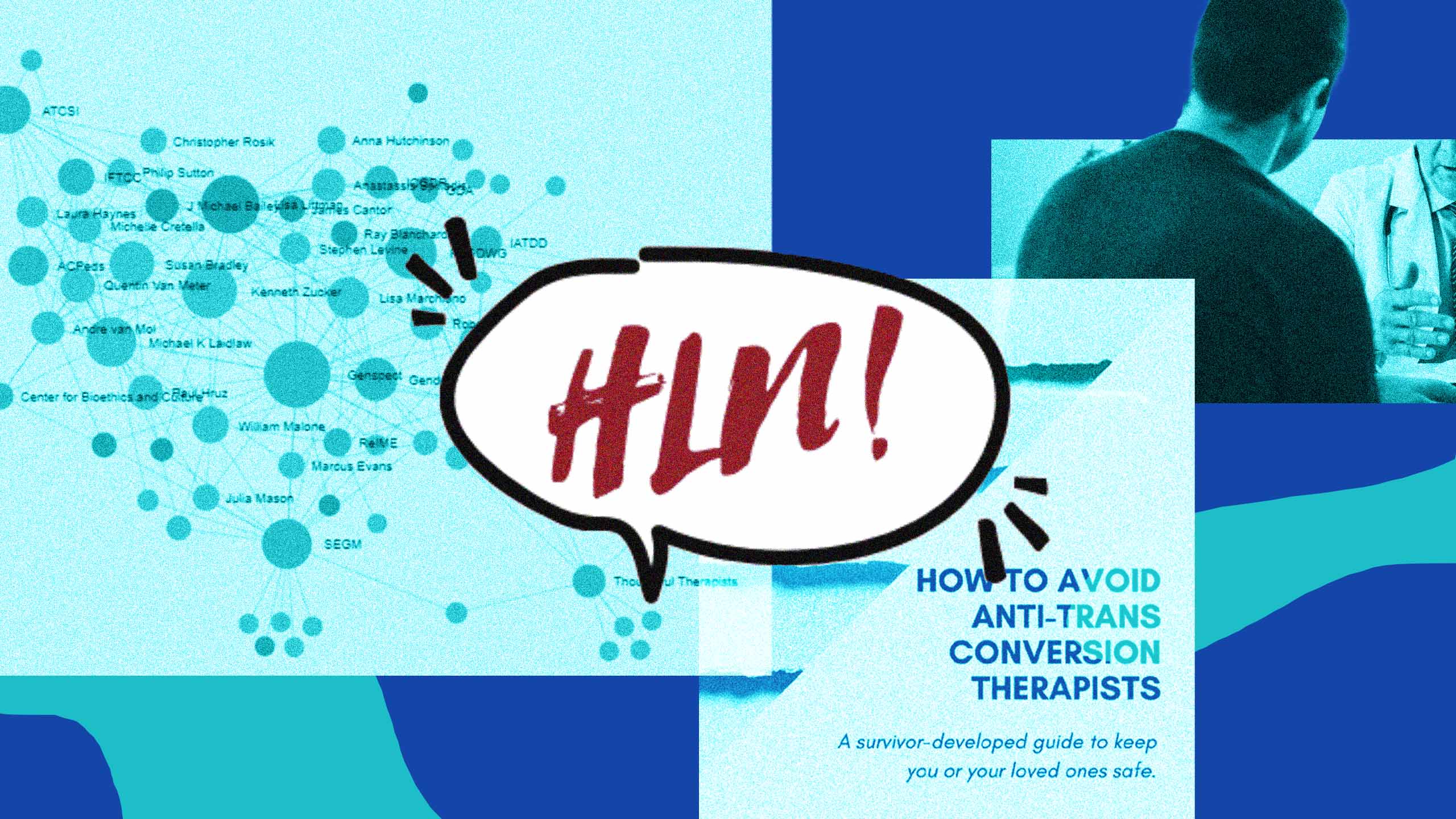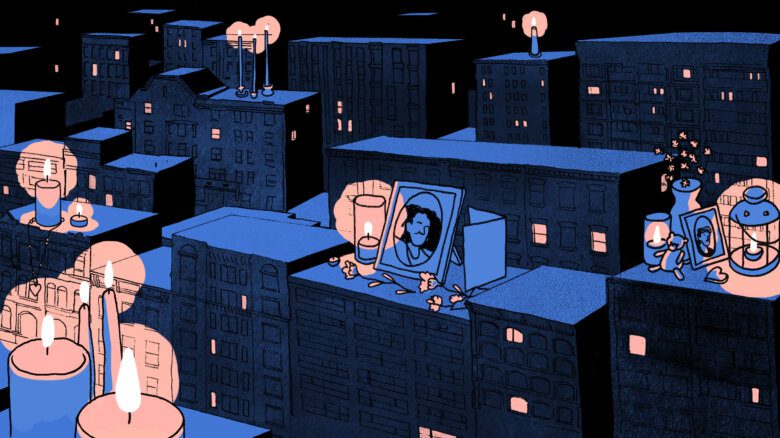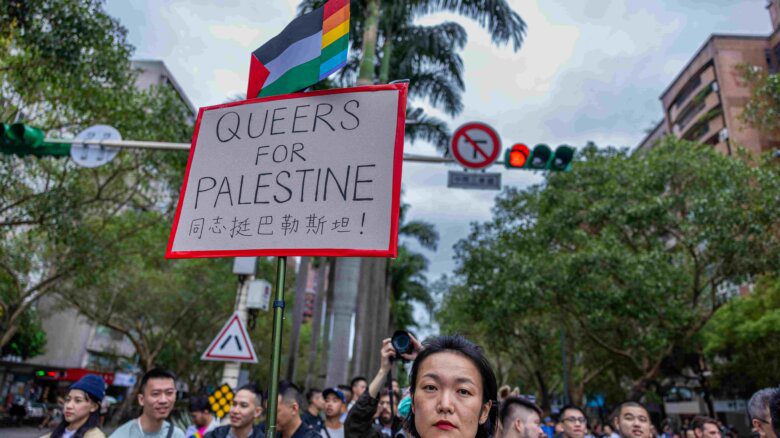In January 2021, Ky Schevers and Lee Leveille launched Health Liberation Now! (HLN), an organization that both puts forward a positive vision of liberation for trans, de/retrans and gender-diverse people through equitable access to healthcare, while also developing resistance strategies against transphobic attacks, which have recently become worse.
The Bell v. Tavistock ruling in the U.K. was a turning point for Schevers and Leveille, when both realized they needed to organize. In this ruling, Keira Bell, a 23-year-old detransitioned woman, sued the National Health Service and temporarily blocked anyone 16 and under in the country from accessing transition-related care. Fortunately, this ruling was overturned by an appeal in September 2021. Watching these events unfold from the U.S., Schevers and Leveille realized that anti-trans organizations were exploiting missing links in healthcare for trans and gender-diverse people. Anti-trans organizations stepped into gaps in trans healthcare and created highly transphobic “support” groups for people considering detransitioning (stopping or reversing elements of one’s transition) and targeting people who have non-linear transitions. These organizations weaponize people’s experiences and construe detransition narratives as tragic.
The weaponization of detransition narratives
Both Schevers and Leveille had previously been involved in transphobic detransition communities, before starting HLN. “We were both involved in these really messed-up detransition communities, which I actually played a role in starting. Now I look back and [realize that community was] actually like a cult or a high-demand group,” Schevers says.
After realizing the harm these groups were causing, Schevers and Leveille decided to use their first-hand experiences to create resistance strategies. “Because I was an activist in this messed-up subculture, I can see how transphobic detrans narratives are used by transphobic groups and organizations to create a lot of harm. I knew how that stuff worked and a lot of the groups and people who were involved. I already had all of this knowledge that I could use to help inform people so they could better resist it,” Schevers explains.
The term “detransition” was first used within trans communities to describe people who had either stopped or reversed aspects of their medical transition. Trans exclusionary radical feminists (TERFs) and other transphobic activists who descibe themselves as “gender critical” have tried to co-opt the term. These anti-trans groups view transition itself as a tragedy and use detransition narratives to justify legal restrictions on all trans people’s access to healthcare, such as in the Bell v. Tavistock ruling.
Contrary to the claims of anti-trans groups, studies show that levels of regret for transition related surgeries are incredibly low. Some people who have started hormone replacement therapy, or begin to socially transition—decide to stop. Sometimes a cessation or a pause in social or medical transition is due to a shifting sense of self. Sometimes it’s due to discouragement after facing rampant transphobia in society. Neither of these moments in someone’s de/re/transition need to result in gender-diverse people ending up in transphobic groups.
“Contrary to the claims of anti-trans groups, studies show that levels of regret for transition related surgeries are incredibly low.”
There is very little support available to people having non-linear transitions, or who are detransitioning. Anti-trans groups exploit this lack of support and create spaces that encourage people to understand their gender identity through a highly transphobic lens. There is a long history of organized anti-trans groups using narratives of detransition to push a transphobic agenda. Reflecting on her own experience in these spaces, Schevers says “I can see now how if there had been more resources, more care, there would have been way less of a chance of people going into these transphobic groups.”
The experience of de/re/transitioning is not as binary as TERF arguments make it out to be. As Leveille explains, “There are detransitioned people who consider themselves to be trans, detransitioned folks who consider themselves non-binary, and some [who] don’t. You also have the folks who consider themselves trans, but have stopped certain aspects of their transition, whether that’s physical, medical, social, whatever—but they don’t necessarily consider themselves to be detransitioned.”
During the Bell v. Tavistock ruling, Schevers began to notice the political connections that were being built by those trying to use detransition as an excuse to attack trans rights. “Details came out that her lawyer had connections to the Alliance Defending Freedom (ADF), one of the major right-wing religious organizations in the United States, which is pushing all the anti-trans bills here,” she says.
To counter this transphobic co-optation of detransition narratives, HLN aims to “give voice to folks who have complicated experiences with transition or detransition, retransition and shifting senses of self that goes beyond a lot of the TERFy areas that people are inevitably getting funnelled into,” Leveille says.
“The majority of the research that is exploring aspects of detransition is dominated by anti-trans research. That’s not okay,” he continues.
Confronting conversion practices
HLN focuses on equitable access to healthcare as a key overlapping need for trans, detrans and gender-diverse people. The focus should be on finding common needs for people who de/re/transition. “A lot of us are impacted by the same healthcare systems when it comes to things like transition or access to reproductive care or having to deal with forced sterilization,” Leveille says.
Conversion practices are prevalent in trans healthcare, which creates major barriers for people trying to access medical care. A recent study found that in the United States, over nine percent of trans adults have reported that a professional has tried to stop them from being trans.
Trans conversion practices have a long history. Conversion practices are often built into the process of accessing transition-related care and can take many different forms. “Right now, there are pockets of trans youth and young adults whose parents are finding their way into ‘gender critical’ circles, or who are getting referrals from anti-trans ‘professional’ groups like the ones I’ve reported on in my report ‘A New Era.’ Those youth and young adults then get coerced into seeing clinicians who end up doing them significant harm,” Leveille says.
HLN created an online interactive mapping project to help identify the relationships between the leadership of anti-trans groups and clinical anti-trans conversion practices. Making these connections explicit helps to explain the international promotion and spread of conversion practices; these are astroturfed campaigns led by anti-trans groups, not legitimate responses to real concerns about trans healthcare.
In response to email requests from people seeking help navigating these issues, HLN has also developed a guide for people concerned that a particular therapist or support group they are seeing or being forced to see by parents might be pushing an anti-trans agenda. “The guide I built has some of the red flags and some of the key questions you can try asking and some of the automatic no-gos based on the things that we’ve seen and what’s being encouraged within anti-trans or gender critical therapy,” Leveille says.
Conversion practices can take many forms, including pressure in therapy or healthcare settings. “I believe it’s possible for something to be self-imposed partially as a result of the surrounding space or culture that you are a part of,” Leveille says. Schevers describes her experience within online detransition groups as a form of conversion practice: “You can just read a blog and pick up ideas and be like, ‘Oh, here’s what I do, and you can do this yourself.’ It’s sort of like DIY conversion practices.”
Trans people trying to access healthcare face a system of hoops to jump through; pathologizing mental health diagnoses, arbitrary restrictions and unnecessary wait times. This common approach is known as the gatekeeping model. There are many other barriers for trans people trying to access gender-affirming care, including the classification of many gender-affirming surgeries as elective, meaning patients cannot get costs covered by insurance and may be subject to significant delays; denial of surgery to people with a body mass index (BMI) over 30 (despite BMI not being an accurate representation of health or fitness) and a long, ongoing history of trans people being forcibly sterilized.
Leveille draws a parallel between the logic of the gatekeeping model to anti-trans conversion practices, saying, “No, really I’m allowed to exist without you trying to push your idea of who I should be on me. Maybe that is a form of conversion therapy, too.”
HLN aims at making the process of transition barrier-free, and advocates an informed consent model, which is based on a patient’s freedom to make choices about their medical care. Right now, they are working toward connecting individual trans people with trusted healthcare practitioners who use informed consent. HLN also emphasizes the need for trauma-informed and peer-supportive approaches to trans healthcare. “With trans people, peer-to-peer support is actually crucial in part because of the trauma so many of us face at the hands of the medical and mental health establishment,” Leveille says.
Building power, fighting back
Anti-trans groups have become much more aggressive in recent years; challenging trans people’s legal rights, taking a voice in major news publications and harassing gender-diverse people in the streets. “In 2021, one of the things that we noticed was that there was a significant uptick in protests happening outside of clinics. These protests were targeting clinics that were providing gender-affirming care for trans youth in particular,” Leveille says.
These tactics have long been used by the anti-abortion movement, which has recently been emboldened in the U.S. by the overturning of Roe v. Wade. This environment creates serious challenges, especially for young people trying to access gender-affirming healthcare.
Trans liberation and reproductive justice share much in common, and could work to build power with one another. Reproductive justice advocates have dealt with harassment while trying to access abortion clinics for a long time, so there already exist tried-and-tested resistance tactics that trans liberation can draw on. “One of the things that people could really benefit from is developing actual escort services for certain times when people are dealing with harassment from anti-trans groups, which is escalating,” Leveille says.
Right now, Leveille and Schevers are the main driving force behind HLN. “[We’re] trying to figure out how do we expand, how do we build relationships with groups who are doing similar projects and have similar goals. How do we continue doing what we’re doing long-term?” Schevers says.
“We both definitely think there needs to be more support for survivors of conversion practices, especially resources specifically aimed at trans, non-binary and gender-diverse people,” Schevers says. HLN wants to provide a place for de/re/trans people to discuss these experiences in a truly supportive environment. Further plans are in the works for HLN to start their own support group or healing space for people to talk about complicated experiences of transition and/or of surviving conversion practices.
Clarification: August 5, 2022 11:18 amThe original paragraph about HLN’s mapping project has been updated to more accurately represent the aims and scope of the project.


 Why you can trust Xtra
Why you can trust Xtra


